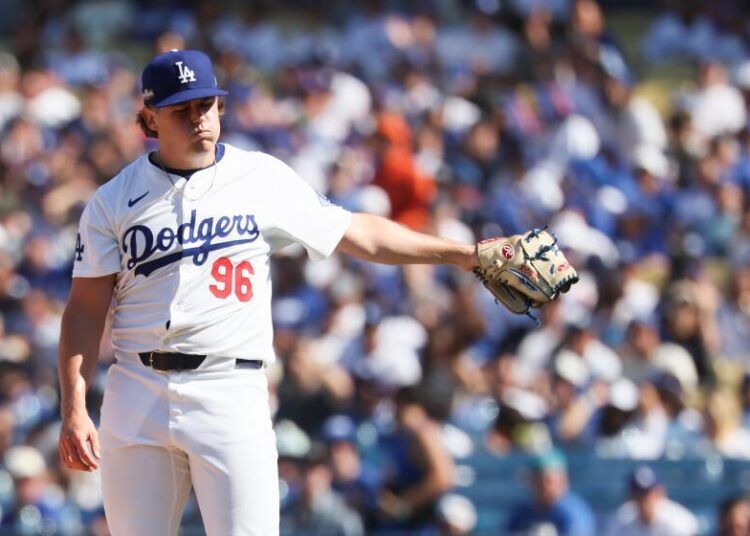In theory, the Dodgers’ decision to go with a bullpen game in Game 2 of the National League Championship Series on Monday made sense.
The club’s lockdown relief corps had just gotten a rare night off, thanks to Jack Flaherty’s seven-inning gem in Game 1. Walker Buehler was an option to make a more traditional start, but the Dodgers wanted to save him for Game 3 in New York instead.
So, they planned to run back the pitching plan that worked so well in Game 4 of the NL Division Series, when they staved off elimination by throwing a group-effort shutout from eight different pitchers.
Read more: Dodgers’ Clayton Kershaw intends to return for 2025 season: ‘Mentally, I feel great’
The only problem: It never materialized.
Unlike last week in San Diego, the Dodgers waited to deploy their highest-leverage relievers on Monday afternoon at Dodger Stadium.
And before they could ever get to them, the game was already out of hand.
In a 7-3 loss to the New York Mets that tied this NLCS at one game apiece, the Dodgers’ record-tying 33-inning scoreless streak ended quickly — and in calamitous fashion — with the Mets scoring one run in the first inning, then striking for five in the second.
Right-hander opener Ryan Brasier gave up a leadoff home run to Francisco Lindor in the game’s first at-bat. Then, the real disaster unfolded after the Dodgers turned to rookie right-hander Landon Knack in the second.
During that Game 4 win over the Padres, Knack — the former second-round draft pick whose solid rookie season wasn’t enough to warrant full starting pitching duties in the playoffs — didn’t take the mound until the ninth inning, when the Dodgers were nursing an eight-run lead.
But on Monday, he was the first pitcher to trot out of the bullpen. Not Anthony Banda (who entered in the second inning of Game 4 in the NLDS). Not Michael Kopech (who was summoned for the third inning that night). And not any of the team’s other dominant relievers.
In hindsight … it was a costly decision.
After giving up a leadoff single and putting another runner on base with a walk, Knack never managed to stop the bleeding. Tyrone Taylor ripped an RBI double down the left-field line for one run. After an intentional walk to Lindor loaded the bases, Mark Vientos worked a nine-pitch at-bat that ended with a grand slam.
Just like that, it was 6-0 Mets.
And after the Dodgers failed to come back, the dynamic of this seven-game series has now shifted.
Suddenly, a series that seemed capable of ending in a sweep after Game 1 now looks like it could go the distance. If it does, another bullpen game will almost certainly be required from the Dodgers at some point.
And for a team that already had starting pitching uncertainties (to put it kindly), Monday showed a relief-reliant plan isn’t fool-proof either.
Granted, poor pitching wasn’t the only reason the Dodgers lost Monday.
Their bats went cold against left-hander Sean Manaea, who entered the game with a career 7.09 ERA against the Dodgers, but held them scoreless until a Max Muncy solo homer in the bottom of the fifth.
And even after they got back within three, scoring a couple runs in the sixth after two errors from the Mets infield, Kiké Hernández twice came up empty while representing the tying or go-ahead run at the plate, rolling into a bases-loaded double-play to end the sixth before flying out with two aboard to end the eighth.
Still, the inability to repeat last week’s bullpen game put the Dodgers behind from the start. Instead of taking a commanding two-game lead in this best-of-seven series, they’ve opened a door for the upstart Mets, who have now stolen away home-field advantage.
Read more: Teoscar Hernández’s agent fires back at critics of one-year Dodgers deal: ‘Who’s laughing now?’
Sign up for more Dodgers news with Dodgers Dugout. Delivered at the start of each series.
This story originally appeared in Los Angeles Times.
Read the full article here


























